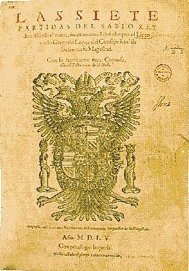Literature of Alfonso X
One of Alfonso’s goals for his kingdom was to lift Castile out of the Dark Ages by producing a united, educated, artistic, and religious population.
His desire to bring Castile into the mainstream of high civilization led to a boom of cultural activity, including the production and translation of a great deal of literature.
The literature produced during his reign was intended to aid him in achieving his goal by giving the common people of Castile access to great intellectual works.
[3] According to author Robert Burns, Alfonso attached a special symbolic meaning to the number seven, which is why he chose to construct his legal code in seven distinct divisions.
It was used as a basis for creating the United States laws used today, for which reason the image of Alfonso X appears in the US House of Representatives.
[1] The work narrates the history of the Spanish territory since Antiquity (from which they take even the most hazy details found in the Bible or in other sources) until the reign of Fernando III of Castile, father of Alfonso X.
Besides, other sources were also used, such as the Bible, classical Latin historiography, ecclesiastical legends, chansons de geste, and Arab historians.
Alfonso’s desire for accuracy led to the use of the great variety of resources used for the work, including classical, Christian, Arabic and French sources.
The tables chart the movements of heavenly bodies, and were only revised from the original after more than ten years of observations in Toledo.
[4] The Lapidario, which discusses the medical properties of various rocks and gems and which includes fabulous illustrations, is also of interest to linguists.
Alfonso also had Libro de ajedrez, dados, y tablas (The Book of Games) translated into Castilian from Arabic and added illustrations with the goal of perfecting the work.
[3] A poem of 1266 ("Pero da Ponte, paro-vos sinal") by Alfonso directed at the Galician troubadour Pero da Ponte [es] accuses both him and Bernal de Bonaval of lacking skill in their art: "Vós nom trobades come proençal, / mais come Bernaldo de Bonaval; / por ende nom é trobar natural / pois que o del e do dem'aprendestes"[5][6][7][8] ("You do not compose like a Provençal / but like Bernaldo de Bonaval / and therefore your poetry-making is not natural / for you learned it from him and from the [D]evil").




